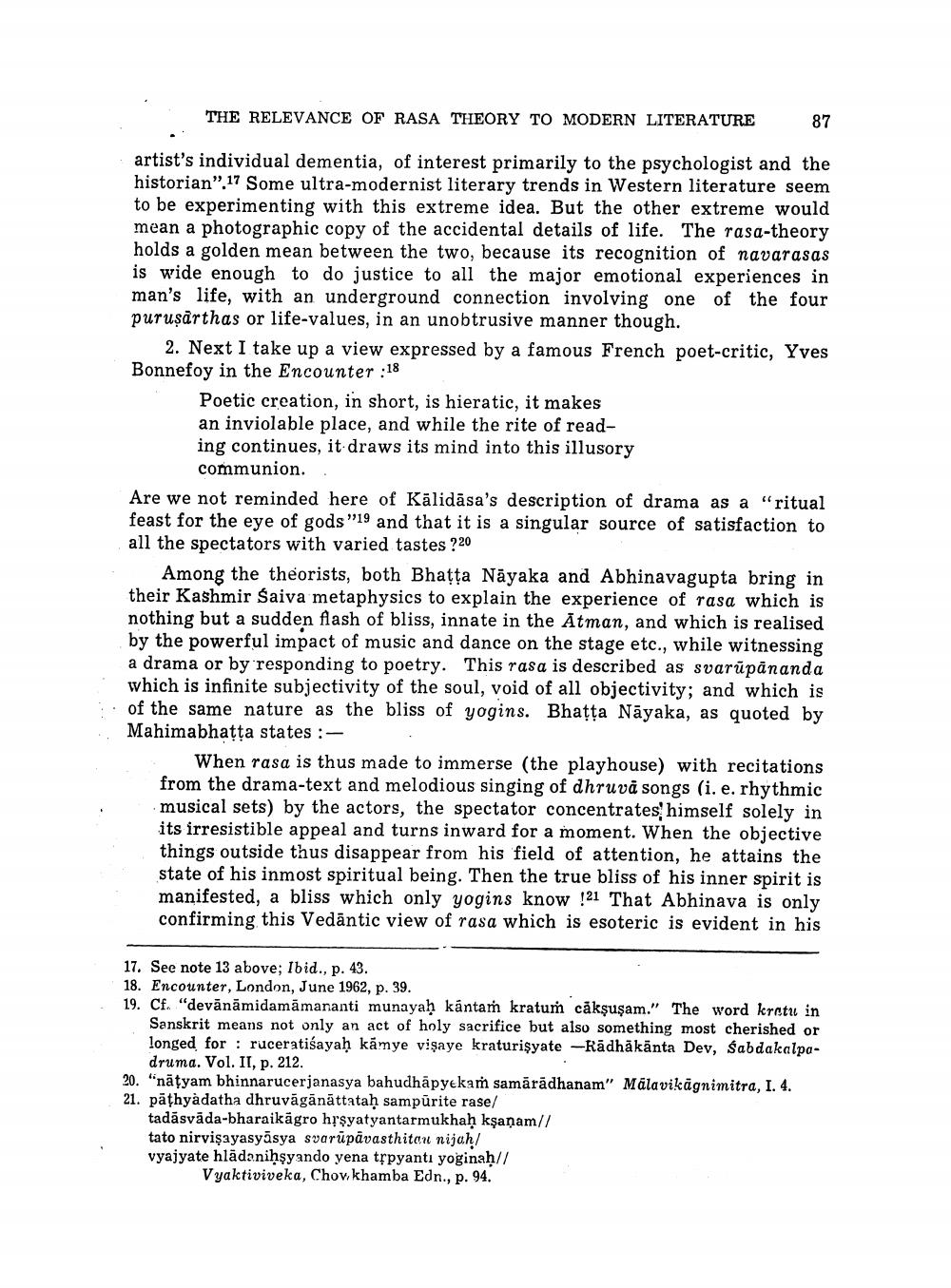________________
THE RELEVANCE OF RASA THEORY TO MODERN LITERATURE
87
artist's individual dementia, of interest primarily to the psychologist and the historian".17 Some ultra-modernist literary trends in Western literature seem to be experimenting with this extreme idea. But the other extreme would mean a photographic copy of the accidental details of life. The rasa-theory holds a golden mean between the two, because its recognition of navarasas is wide enough to do justice to all the major emotional experiences in man's life, with an underground connection involving one of the four puruşarthas or life-values, in an unobtrusive manner though.
2. Next I take up a view expressed by a famous French poet-critic, Yves Bonnefoy in the Encounter :18
Poetic creation, in short, is hieratic, it makes an inviolable place, and while the rite of reading continues, it draws its mind into this illusory
communion.. Are we not reminded here of Kālidāsa's description of drama as a "ritual feast for the eye of gods "19 and that it is a singular source of satisfaction to all the spectators with varied tastes ?20
Among the theorists, both Bhatta Nāyaka and Abhinavagupta bring in their Kashmir Saiva metaphysics to explain the experience of rasa which is nothing but a sudden flash of bliss, innate in the Atman, and which is realised by the powerful impact of music and dance on the stage etc., while witnessing a drama or by responding to poetry. This rasa is described as svarūpānanda which is infinite subjectivity of the soul, void of all objectivity; and which is of the same nature as the bliss of yogins. Bhatta Nāyaka, as quoted by Mahimabhatta states :
When rasa is thus made to immerse (the playhouse) with recitations from the drama-text and melodious singing of dhruva songs (i. e. rhythmic musical sets) by the actors, the spectator concentrates himself solely in its irresistible appeal and turns inward for a moment. When the objective things outside thus disappear from his field of attention, he attains the state of his inmost spiritual being. Then the true bliss of his inner spirit is manifested, a bliss which only yogins know !21 That Abhinava is only confirming this Vedāntic view of rasa which is esoteric is evident in his
17. See note 13 above; Ibid., p. 43. 18. Encounter, London, June 1962, p. 39. 19. Cf. "devānāmidamāmananti munayah kántam kratuṁ cākşuşam." The word krctu in
Sanskrit means not only an act of holy sacrifice but also something most cherished or longed for : ruceratiśayah kämye vişaye kraturişyate -Rädhäkänta Dev, Sabdakalpa
druma. Vol. II, p. 212. 20. "nāțyam bhinnarucerjanasya bahudhāpyekaṁ samărădhanam" Mālavikāgnimitra, I. 4. 21. pāțhyadatha dhruvāgānăttataḥ sampūrite rase/
tadāsvāda-bharaikāgro hrsyatyantarmukhaḥ kşanam// tato nirvisayasyāsya svarūpāvasthitou nijah/ vyajyate hlādanihsyando yena třpyantı yoginaḥ//
Vyaktiviveka, Chov.khamba Edn., p. 94.




